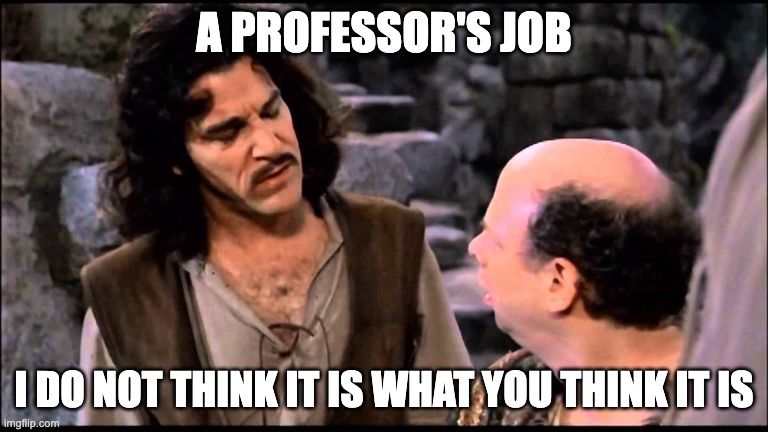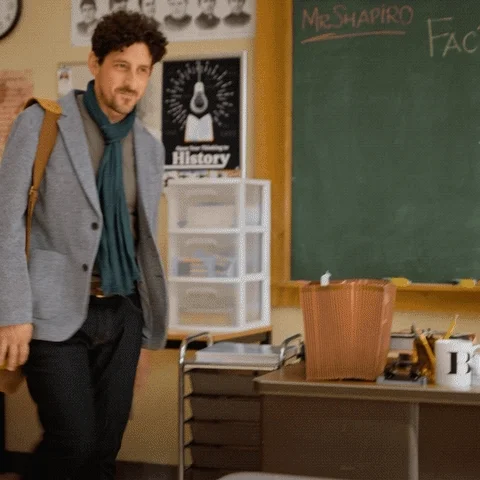
This logo isn't an ad or affiliate link. It's an organization that shares in our mission, and empowered the authors to share their insights in Byte form.
Rumie vets Bytes for compliance with our
Standards.
The organization is responsible for the completeness and reliability of the content.
Learn more
about how Rumie works with partners.
I'm a college professor. It's been rewarding, but there are things I didn't expect.
I'd expected professors to have PhDs and work at their colleges full-time. I also expected them to do non-stop research, and have Teaching Assistants grade all their assignments.

I also thought students would submit all their assignments on time, and if they couldn't, I expected they'd ask for extensions. But that's simply not true.
Since becoming a professor, I've learned it's a demanding job with big expectations!

Did you know?
Canadians and Americans use the word college differently. In Canada, college is equivalent to community colleges in the U.S.A. Check out this Byte to learn more.
1. Full-time jobs are rare and difficult to get

Did you know that the majority of college professors in Canada and the U.S. are on contract?
This means they probably only teach at your college part-time, or at multiple colleges at the same time.

Because of this, full-time positions are highly sought after and competitive. In fact, part-time professors outnumber full-time professors by 50%, and this difference continues to grow.

Getting a full-time position requires you to stand out by:
Getting a Masters degree and more likely a PhD 🎓
Conducting research and submitting it to be published 🔬
Presenting at conferences 🎤
Receiving excellent evaluations from students, colleagues, and department heads 💯
Test Your Knowledge
Sofia and Mark are two part-time college professors. They both applied for the same full-time position as a Spanish Professor at their college. Read about their experience:
Sofia (she/her)

Achieved a Ph.D. in Applied Linguistics
Speaks English and Spanish fluently
Published 3 articles
Presents at an applied linguistics conference every year
Colleagues say she's helpful and has unique learning activities
Mark (he/him)

Achieved a Masters in Applied Linguistics
Speaks English and Spanish fluently
Currently researching Spanish assessment strategies
Hasn't been to an applied linguistics conference 5 years
Students love him
Quiz
Who would be more likely to get the full-time position as a Spanish professor at their college?
Although both candidates sound ideal, Sofia's the better option. She has a Ph.D. and regularly conducts research and attends conferences showing that she keeps updated in her area of expertise. Mark is currently conducting research, but he doesn't show much other motivation to keep updated on current research in his field.
2. The workload's huge

Remember when I said I thought professors had Teaching Assistants? In colleges, that isn't the case.
That isn't to say they don't have help, but no one is teaching their classes or marking assignments for them.

Professors have a lot to do inside and outside of the classroom. This includes:
Planning lessons
Designing curriculum and assessments
Grading assignments and providing feedback
Meeting students and offering support
Participating in professional development
Did you know?
As professors become more experienced with teaching and their curriculum, they tend to spend less time preparing for lessons. This opens up valuable time to conduct research and present at conferences to become a more desirable candidate for those full-time professor positions when they become available. 💪🏽
3. Relationships with students can be challenging

Colleges are one of the most diverse places. Students come to class with different life experiences. So, professors can't expect all their students to come to class every week, submit their assignments on time, or communicate when they miss class or need more time on an assignment.

Request a meeting with the student.
Before meeting the student, think about the goal of the conversation.
At the start of the meeting, state the goal.
When the student speaks, listen carefully.
After the student speaks, share your perspective.
Brainstorm solutions together.
End the meeting by summarizing the conversation or setting up a meeting for the future.
Sometimes students feeling heard may be all that is needed in a difficult situation.

Test Your Knowledge
Sophia noticed a student's stopped attending her class, and they didn't submit the last 2 assignments. She sends them an email to set up a meeting. In the meeting, she learns the student works full-time and needs to take care of their younger siblings in the evenings.

Quiz
What should Sophia do next? Select all that apply:
By offering your perspective on the situation and problem-solving solutions together, both Sophie and the student can come up with a plan for them to get back into their studies. If she concluded the meeting or told the student that their situation isn't an excuse, she'd show that she doesn't care about the sacrifices the student is making. This could make for even more serious problems in the future.
Take Action
Being a college professor isn't easy, but it can be a rewarding career if you know what to expect!

Consider whether becoming a college professor is right for you:
This Byte has been authored by
Jessica MacDonald
Eng. Communications Professor
M.Ed., TESOL
